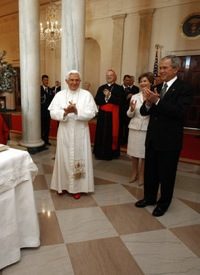
On April 18, the pope addressed the General Assembly of the United Nations. Speaking partly in French and partly in English, Pope Benedict praised the world body despite its militant secularism. The pope began by inexplicably lauding the UN’s coercive nature, and he went on to praise the UN’s concept of human rights — both of which are in measure feared and scorned by many religious peoples:
• “The United Nations embodies the aspiration for a ‘greater degree of international ordering’ … inspired and governed by the principle of subsidiarity, and therefore capable of responding to the demands of the human family through binding international rules and through structures capable of harmonizing the day-to-day unfolding of the lives of peoples.”
• “Human dignity, which is the foundation and goal of the responsibility to protect, leads us to the theme we are specifically focusing upon this year, which marks the sixtieth anniversary of the Universal Declaration of Human Rights.”
Contrary to the pope’s favorable comments, the UN doesn’t espouse sacrosanct rights or protect such rights and human dignity. To it, “rights” are human activities that the UN allows people to undertake. The Universal Declaration of Human Rights proclaimed by the UN General Assembly in 1948 presumes the power to grant rights (unlike the Declaration of Independence, which declares that men are “endowed by their creator” with such rights) and further presumes the power to cancel them. For example, a revision of the 1948 document, the 1966 International Covenant on Civil and Political Rights, states:
Article 1B: 1. Everyone shall have the right to freedom of thought, conscience and religion…. 3. Freedom to manifest one’s religion or beliefs may be subject only to such limitations as are prescribed by law. [Emphasis added.]
Since it is unlikely that Pope Benedict believes that freedom to manifest one’s religion or beliefs may be subject to limitations as are prescribed by law (as in China), the faithful Catholic who understands the true nature of the United Nations will very likely find some statements made by the pope before the General Assembly confusing and disturbing.
On his final day in America, the pope visited the Ground Zero site of the September 11 attack on the World Trade Center and celebrated mass at Yankee Stadium before 57,000 worshipers. In his homily at that event, Benedict spoke against abortion, affirming “the truths which alone can guarantee respect for the inalienable dignity and rights of each man, woman and child in our world — including the most defenseless of all human beings, the unborn child in the mother’s womb.”



